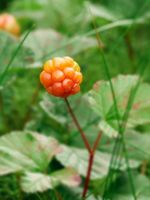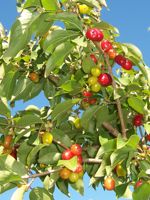Mon-Fri 9am - 5pm Mountain time
Cloudberry vs Cornelian Cherry Dogwood
Rubus chamaemorus
Cornus mas
NOT AVAILABLE THIS SEASON - MIGHT RETURN
NOT AVAILABLE THIS SEASON - MIGHT RETURN
Cloudberry produces berries which taste tart and tangy with a sweet, floral hint. The berries have a creamy texture when overripe. They are often used to make jams, juices, and liquors. The berries are a pale red colour and when ripe turn more orange/amber. They do not grow very tall, generally reaching only 10-25 cm.
Cloudberry has distinct male and female plants. In order to produce berries, both must be present and pollinate with each other. Berries are produced at maturity, typically 5-7 years, and produce 1 berry per stem. The plant spreads naturally as they grow using modified underground stems (rhizomes), forming more plants over time in the same area.
This plant can be found wild in Canada’s boreal forest. In Newfoundland and Labrador, this plant is known as the Bakeapple and is a significant regional food. Similarly the Côte-Nord region of Quebec also has a long history of using this berry.
Note: Cloudberries require very specific soil conditions. They need well-drained soil with a pH between 3.5 and 5.0. Also sensitive to salt and dry conditions.
Note: Our seedlings are grown from seed and are too young to identify their sex.
Cornelian Cherry Dogwood is an ornamental plant with a variety of uses as it can be grown as a shrub, small tree, hedge, or privacy screen. The bright yellow flowers grow in clusters and bloom in late winter to early spring, providing an early food source for pollinators. They are visually striking as the flowers bloom before the leaves appear and last for several weeks.
Red, cherry-like fruits are produced in midsummer. They are edible but are better suited for preserves and syrups as the taste is fairly sour and astringent, similar to that of sour cherries and cranberries.
The Cornelian Cherry Dogwood was the winner of the Gold Medal Award from The Pennsylvania Horticultural Society as well as the Cary Award for having superior landscape appeal and for being winter hardy and pest resistant.

